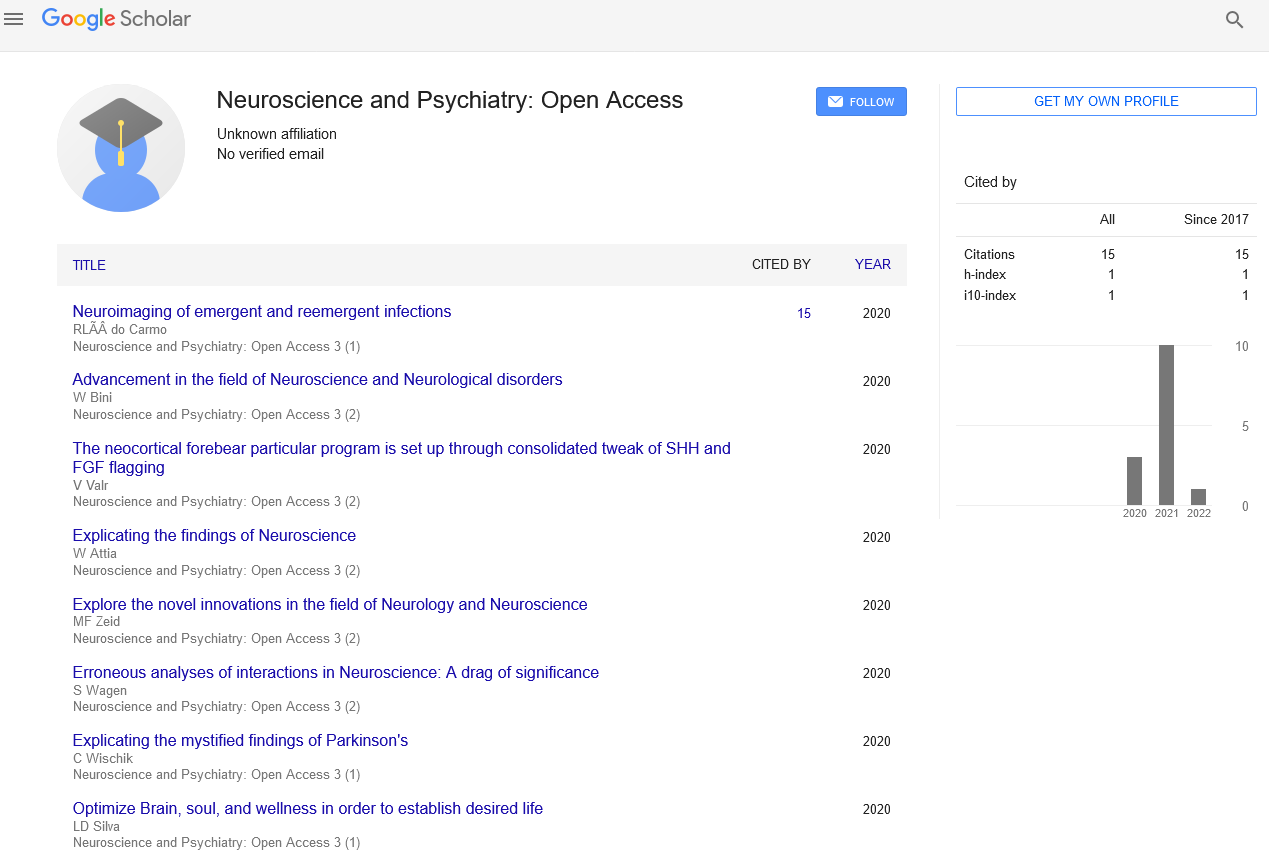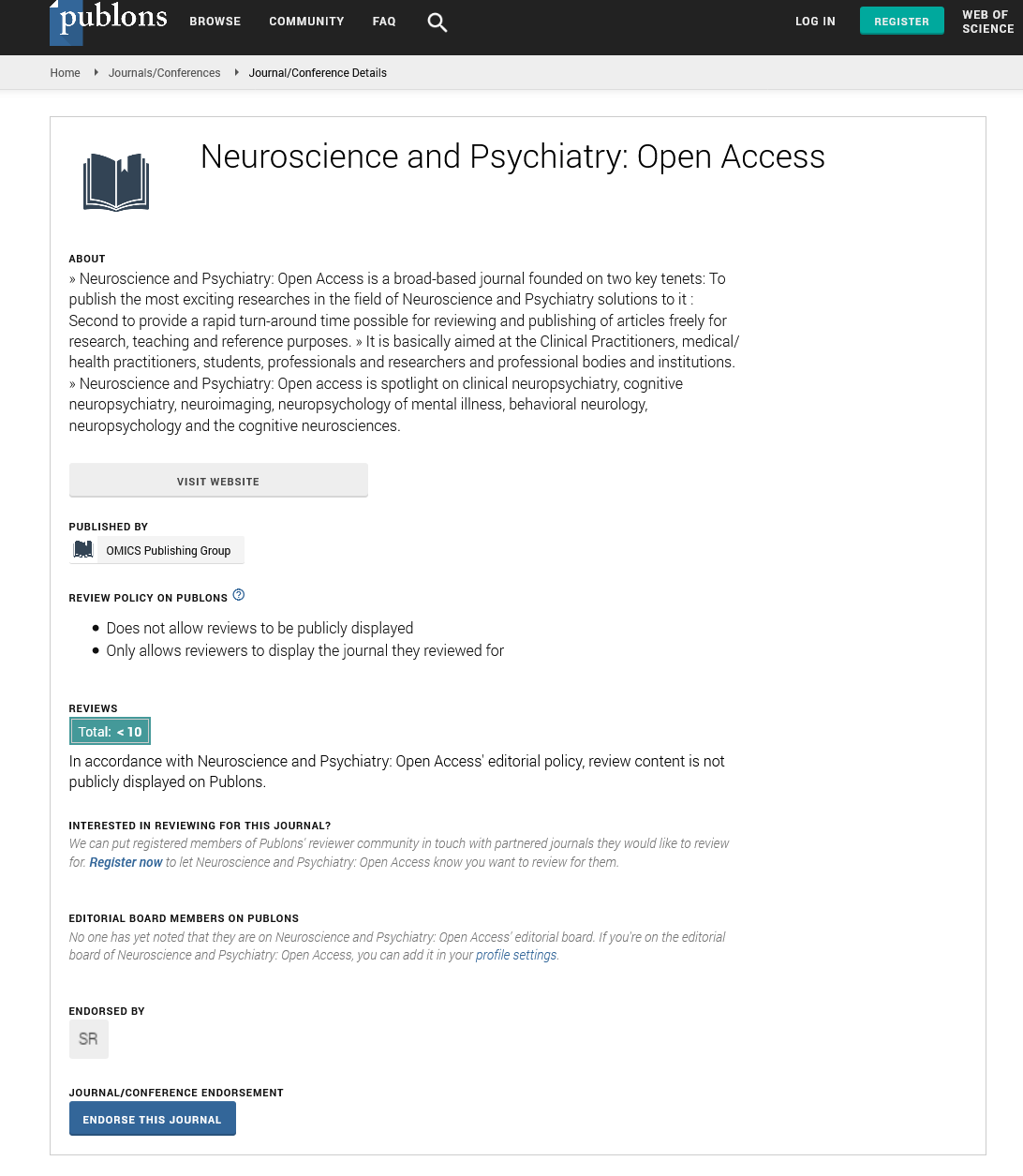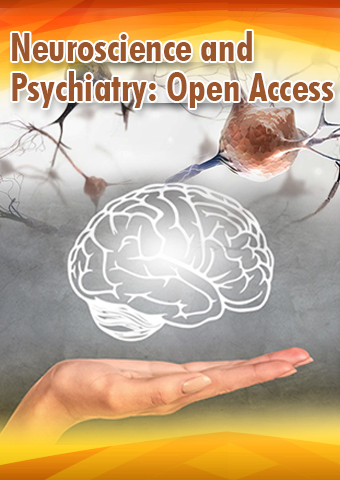Perspective - Neuroscience and Psychiatry: Open Access (2024) Volume 7, Issue 5
The Role of Neuroinflammation in Psychiatric Disorders
- Corresponding Author:
- Michael Levin
Department of Psychiatry and Behavioral Sciences,
Johns Hopkins University,
Maryland,
USA
E-mail: michael.l@tufts.edu
Received: 09-09-2024, Manuscript No. NPOA-24-140621; Editor assigned: 12-09-2024, PreQC No. NPOA-24-140621 (PQ); Reviewed: 26-09-2024, QC No. NPOA-24- 140621; Revised: 07-10-2024, Manuscript No. NPOA-24-140621 (R); Published: 14-10-2024, DOI: 10.47532/npoa.2024.7(5).265-267
Introduction
Neuroinflammation refers to the inflammatory response within the brain or spinal cord, typically involving the activation of glial cells, such as microglia and astrocytes. While inflammation is a normal part of the body’s defense mechanism against injury or infection, chronic neuroinflammation can have deleterious effects on brain function and has been increasingly recognized as a contributing factor in various psychiatric disorders. This article explores the mechanisms of neuroinflammation, its role in psychiatric conditions, and the potential therapeutic strategies to mitigate its effects.
Description
Mechanisms of neuroinflammation
Neuroinflammation involves a complex interplay of cellular and molecular processes that can alter brain function and structure.
Microglia activation
Microglia are the primary immune cells of the Central Nervous System (CNS), constantly surveying the brain for potential threats. In response to injury, infection, or other stimuli, microglia become activated, changing their morphology and function. Activated microglia release pro-inflammatory cytokines, chemokines, and other mediators that initiate and propagate the inflammatory response. While this response is crucial for clearing pathogens and damaged cells, excessive or chronic microglial activation can lead to neuronal damage and dysfunction.
Astrocyte reactivity
Astrocytes are another type of glial cell that play a vital role in maintaining CNS homeostasis, including supporting neurons and modulating synaptic activity. In the context of neuroinflammation, astrocytes can become reactive, characterized by changes in morphology and function. Reactive astrocytes release pro-inflammatory mediators and can contribute to the disruption of the Blood-Brain Barrier (BBB), exacerbating inflammation and potentially allowing peripheral immune cells to infiltrate the CNS.
Cytokine release
Cytokines are small proteins that regulate immune responses and inflammation. Proinflammatory cytokines, such as Interleukin-1β (IL-1β), Tumor Necrosis Factor-alpha (TNF-α), and Interleukin-6 (IL-6), play pivotal roles in neuroinflammation. These cytokines can directly affect neuronal function, altering neurotransmitter systems, synaptic plasticity, and neurogenesis. Elevated levels of pro-inflammatory cytokines have been observed in various psychiatric disorders, suggesting a link between systemic inflammation and brain health.
Neuroinflammation and psychiatric disorders
The association between neuroinflammation and psychiatric disorders has gained substantial attention in recent years. Several psychiatric conditions, including depression, schizophrenia, bipolar disorder, and anxiety, have been linked to chronic neuroinflammatory processes.
Depression
Major Depressive Disorder (MDD) is a common and debilitating psychiatric condition characterized by persistent low mood, anhedonia, and cognitive impairments. Increasing evidence suggests that neuroinflammation plays a critical role in the pathophysiology of depression.
Cytokine hypothesis: The cytokine hypothesis of depression posits that elevated levels of proinflammatory cytokines can contribute to the development of depressive symptoms. Studies have shown that individuals with depression often have higher levels of IL-1β, IL-6, and TNF-α in their blood and cerebrospinal fluid. These cytokines can affect the Hypothalamic- Pituitary-Adrenal (HPA) axis, leading to increased cortisol levels and further promoting inflammation.
Neurotransmitter systems: Neuroinflammation can disrupt neurotransmitter systems implicated in depression, including serotonin, dopamine, and glutamate. Pro-inflammatory cytokines can alter the metabolism of these neurotransmitters, reducing their availability and contributing to depressive symptoms.
Neurogenesis: Chronic neuroinflammation can impair neurogenesis, particularly in the hippocampus, a brain region critical for mood regulation and cognitive function. Reduced hippocampal neurogenesis has been observed in individuals with depression, potentially contributing to cognitive deficits and emotional dysregulation.
Schizophrenia
Schizophrenia is a severe psychiatric disorder characterized by hallucinations, delusions, disorganized thinking, and cognitive impairments. Neuroinflammation has been implicated in the pathophysiology of schizophrenia through several mechanisms.
Prenatal inflammation: Maternal infection and inflammation during pregnancy have been associated with an increased risk of schizophrenia in offspring. Prenatal exposure to inflammatory mediators can disrupt normal brain development, leading to long-term alterations in brain structure and function.
Microglial activation: Postmortem studies of individuals with schizophrenia have revealed increased microglial activation in the brain. Activated microglia can release pro-inflammatory cytokines and other neurotoxic substances, contributing to neuronal damage and synaptic dysfunction.
Dopaminergic dysfunction: Neuroinflammation can affect the dopaminergic system, which is crucial for regulating mood, cognition, and behavior. Pro-inflammatory cytokines can alter dopamine metabolism and signaling, potentially contributing to the positive and negative symptoms of schizophrenia.
Bipolar disorder
Bipolar disorder is characterized by mood swings ranging from depressive episodes to manic or hypomanic episodes. Emerging evidence suggests that neuroinflammation may play a role in the pathophysiology of bipolar disorder.
Inflammatory markers: Elevated levels of proinflammatory cytokines, such as IL-6 and TNF-α, have been observed in individuals with bipolar disorder, particularly during mood episodes. These cytokines can affect mood regulation and contribute to the episodic nature of the disorder.
Oxidative stress: Neuroinflammation is associated with increased oxidative stress, which can damage cellular structures and impair neuronal function. Oxidative stress has been implicated in the pathophysiology of bipolar disorder, potentially contributing to mood instability and cognitive impairments.
Mitochondrial dysfunction: Chronic neuroinflammation can lead to mitochondrial dysfunction, affecting energy metabolism and neuronal health. Mitochondrial dysfunction has been observed in individuals with bipolar disorder, suggesting a link between inflammation, energy metabolism, and mood regulation.
Anxiety disorders
Anxiety disorders encompass a range of conditions characterized by excessive fear, worry, and physiological arousal. Neuroinflammation has been implicated in the development and maintenance of anxiety disorders through several pathways.
HPAaxisdysregulation: Chronic neuroinflammation can disrupt the HPA axis, leading to dysregulation of cortisol production and stress responses. Altered HPA axis function is commonly observed in individuals with anxiety disorders, contributing to heightened stress sensitivity and anxiety symptoms.
Amygdala hyperactivity: The amygdala is a key brain region involved in the processing of fear and anxiety. Neuroinflammation can lead to hyperactivity of the amygdala, resulting in exaggerated fear responses and increased anxiety.
Neurotransmitter imbalances: Pro-inflammatory cytokines can affect neurotransmitter systems involved in anxiety regulation, including serotonin, GABA, and glutamate. Imbalances in these neurotransmitter systems can contribute to the development and persistence of anxiety disorders.
Therapeutic implications
Understanding the role of neuroinflammation in psychiatric disorders has significant implications for the development of novel therapeutic strategies.
Anti-inflammatory treatments
Targeting neuroinflammation directly with antiinflammatory treatments is a promising approach for managing psychiatric disorders. Several classes of medications have been investigated for their potential anti-inflammatory effects.
Non-Steroidal Anti-Inflammatory Drugs (NSAIDs): NSAIDs, such as aspirin and ibuprofen, have been explored for their potential to reduce inflammation and alleviate depressive symptoms. Some studies have shown that NSAIDs can improve mood and reduce inflammation in individuals with depression.
Cytokine inhibitors: Medications that specifically target pro-inflammatory cytokines, such as TNF-α inhibitors, have shown promise in treating depression and other psychiatric disorders. These medications can reduce inflammation and improve symptoms in individuals with treatment-resistant depression.
Minocycline: Minocycline is an antibiotic with anti-inflammatory properties that has been investigated for its potential to treat neuroinflammation in psychiatric disorders.
Some studies have shown that minocycline can improve mood and cognitive function in individuals with depression and schizophrenia.
Lifestyle interventions
Lifestyle interventions that reduce inflammation and promote overall brain health can also be beneficial for individuals with psychiatric disorders.
Diet: Anti-inflammatory diets, rich in fruits, vegetables, whole grains, and omega-3 fatty acids, can help reduce systemic inflammation and improve mental health. Dietary interventions that reduce inflammation may complement traditional psychiatric treatments.
Exercise: Regular physical exercise has been shown to reduce inflammation, enhance neurogenesis, and improve mood. Exercise can be a valuable adjunctive treatment for managing depression, anxiety, and other psychiatric disorders.
Stress management: Chronic stress is a significant contributor to neuroinflammation. Stress management techniques, such as mindfulness meditation, yoga, and relaxation exercises, can reduce stress and inflammation, improving overall mental health.
Conclusion
The genetics of Major Depressive Disorder (MDD) provide valuable insights into the etiology and potential treatment of this complex condition. Genetic markers, heritability estimates, family studies, twin studies, and gene-environment interactions all contribute to our understanding of the genetic underpinnings of MDD. Advances in genetic research have the potential to improve diagnosis, personalize treatment, and inform prevention strategies. As research progresses, a more comprehensive understanding of the genetic and environmental factors contributing to MDD will likely emerge, offering hope for better outcomes for individuals affected by this debilitating disorder.


